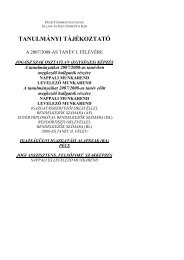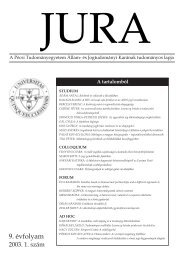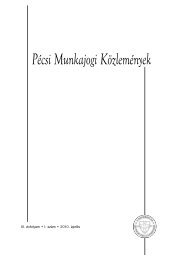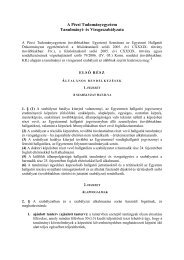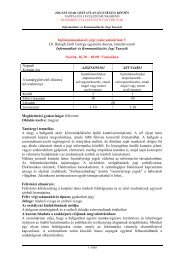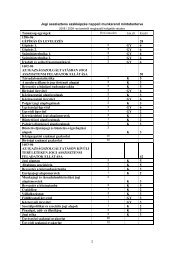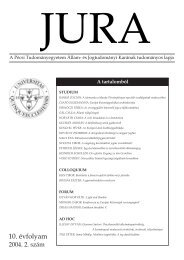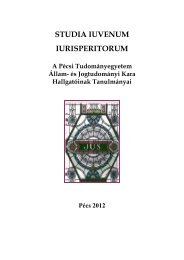2012. évi 2. szám - Jura - Pécsi Tudományegyetem
2012. évi 2. szám - Jura - Pécsi Tudományegyetem
2012. évi 2. szám - Jura - Pécsi Tudományegyetem
- TAGS
- jura
You also want an ePaper? Increase the reach of your titles
YUMPU automatically turns print PDFs into web optimized ePapers that Google loves.
André Ramos Tavares: The case of the borderless use of Constitutional Courts decisions in human rights183But textual proximity is not a determining factornor does it offer definitive reasons for using foreignconstitutional case law. Indeed, as I have already expressedin a work published in 2000 together with thelate and fondly-remembered jurist Celso Bastos, “anyantagonism between Constitutions can be merely apparent,or textual, to the extent that a large part of thelegal element is constructed by way of interpretativeactivity.” (Bastos, Tavares, 2000: 44).Universalist theses concerning fundamental humanrights end up ignoring the Law as a typically culturalphenomenon and, furthermore, render difficulthealthy interlocution between distinct constitutionaljurisdictions. As I mentioned previously, interlocutionwill not occur in the event that one of the systemshas the pretention of being in possession of the truth asconcerns its positions. But it is also not possible to imaginean absolute relativism, equally unproductiveand impeditive of effective interlocution.The (receiving) Court should check the textualsimilarity or proximity between the Constitution ofits country and the Constitution of the country wherethe constitutional decision to be used was rendered.This proximity is important when the intention isto develop rights present in the Constitution andincluded in the patrimony of Humanity. But grammaticalproximity alone is insufficient, as mentioned,because it is also necessary to ascertain the compatibilitybetween similar constitutional bodies regardingtheir constitutional practices and purposes.It is necessary “to underline common elements (...)more than just merely make comparisons betweenconstitutional bodies. It is necessary to collect ampleknowledge about the constitutional Law of each ofthe countries under analysis.’ (Bastos, Tavares, 2000:44). This is a presupposition for the correct and not“de-contextualized” use of foreign elements by theconstitutional jurisdiction of any country, althoughdistorted and improper references are an everpresentrisk which can, nevertheless, be minimizedand even avoided.In this sense I can quote the case heard by theBrazilian Supreme Federal Court concerning theanti-semitical book by S. Ellwanger, who negatedthe Jewish Holocaust and promoted racism (HC8<strong>2.</strong>424-2/RS). In this famous case, Minister GilmarMendes cites decisions rendered by the SupremeCourt of the United States and the House of Lordsas being some of the “elements” that led him to hisconviction on the meaning and scope of the term“racism”, in its historic and cultural construction; hecites, further, a decision rendered by the EuropeanCourt of Human Rights that later assisted him incontextualizing his conviction, such decision beingon the proportionality of the very same principlesunder consideration in the case submitted to theBrazilian Supreme Federal Court.Considering that constitutionalism poses identicalproblems for Constitutional States and thatone of the greatest objectives of true Democracy isprecisely to promote fundamental human rights toa maximum, it is even possible to cogitate an implicitfundamental right, precisely by reason of theextensive protection afforded by the cross utilizationof non-national case law.It is worth mentioning, at this point, the commonhistorical question of the military dictatorships inLatin America and the amnesty laws relative to politicalcrimes and the torturers of the military regime.The central question was precisely whether the lawscreated by the military for the military could be consideredvalid and if, as a consequence, the perpetratorsof all the crimes would qualify for amnesty. Thelegitimacy of these laws was, in general, questionedby later democratic regimes. The Brazilian SupremeCourt, in a recent entry of judgment (ADPF 153-DF),was confronted by the same theme and produced anextensive comparative work on the amnesty laws ofother States as well as on the constitutional decisionsrendered at a later date by the Courts thereof on theirlaws, citing the Supreme Court of Chile, the SupremeCourt of Argentina (2007) and the Supreme Court ofUruguay (2009), among others. In the same entry ofjudgment, Minister E. R Lewandowski, through hisvote, could be clearly seen to be concerned aboutthe contextualization of the theme. The conclusion,in both the foreign and Brazilian cases, was that theamnesty was valid and should be respected, withoutprejudice of ascertaining the authors and allowingfull access by the citizens to the data and events ofthat period in History.Therefore, within a constitutional system that permits(and, for more compelling reasons, that imposes)the critical and consistent (constant) use of foreignconstitutional case law, such use should be mandatory,since it arises from the very idea of security andthe maximization of fundamental human rights. Anyrejection of foreign case law beneficial to the fundamentalrights in question would have to be justified based on thelatent peculiarities of each national Constitution.Foreign case law should be used in a ponderedfashion and the appropriateness of foreign elementsin the national ambit should be fully demonstrated.And I propose that the Constitutional Courts beauthorized and compelled when it comes to concretizingfundamental human rights, by virtue of theirdogmatic preoccupation that such rights be fullyrealized. This sort of conduct is not only welcome,but should also be imposed on countries slow inconsolidating these rights, such rights being solemnlyJURA 2012/<strong>2.</strong>



